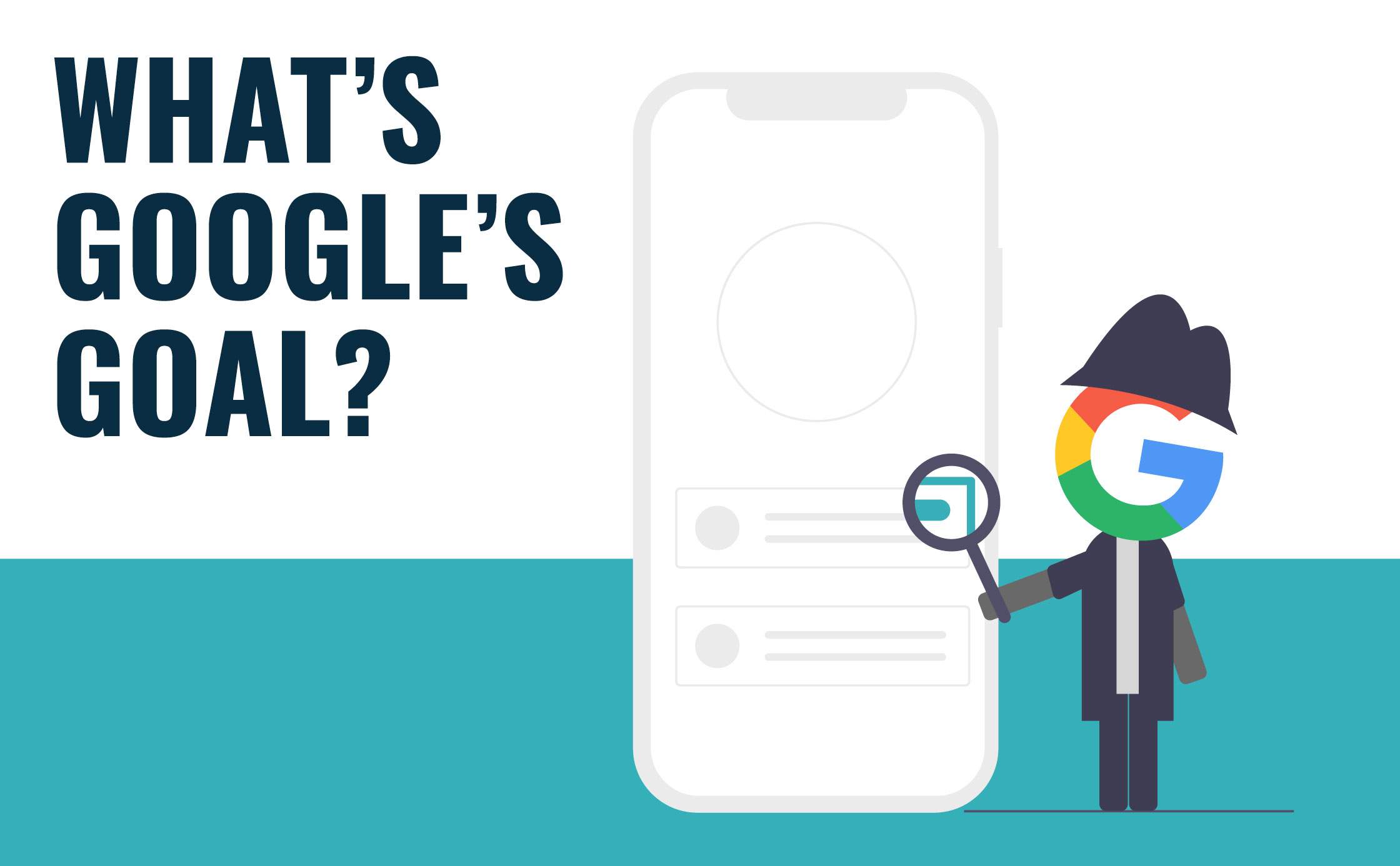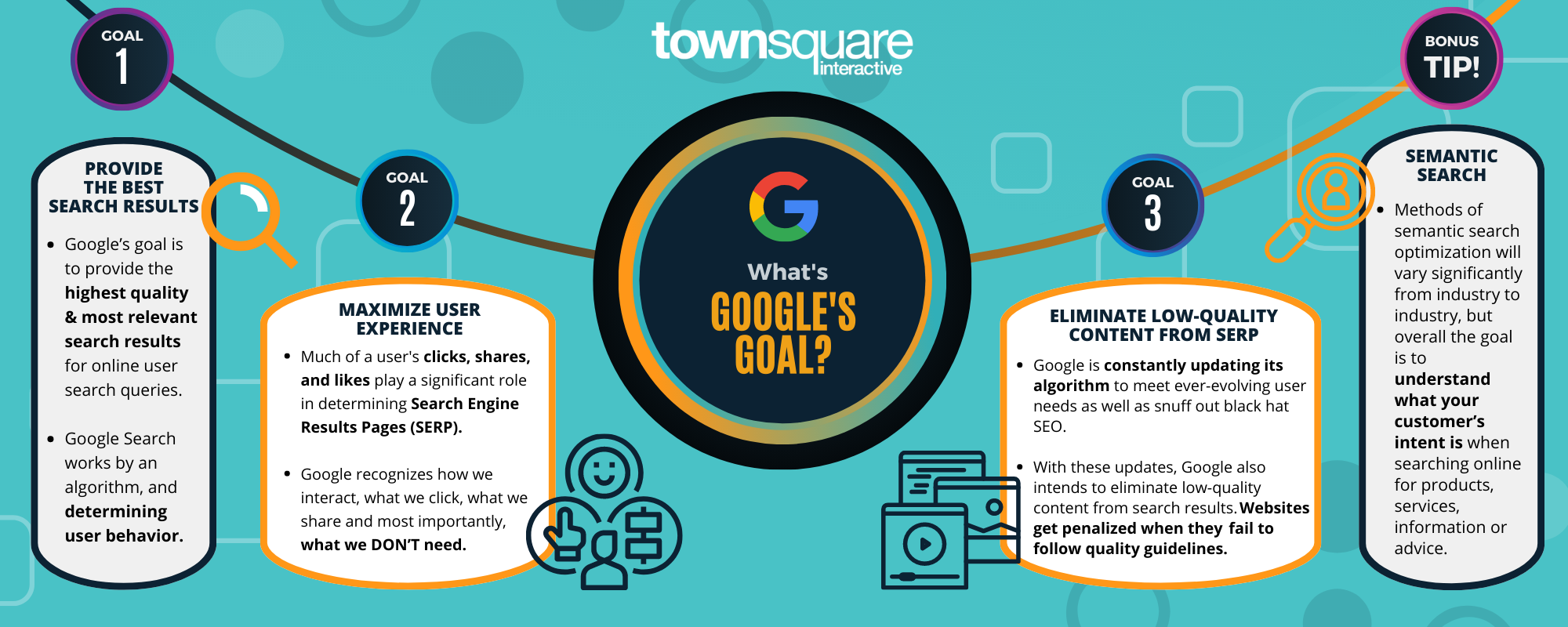by Ryan Dearth
Updated on January 4, 2024
As a company, Google’s mission is “To organize the world’s information and make it universally accessible and useful.”
Dominating over 90% of the market share, Google has ushered users through the digital era and set the standard for online search, paving the way for other search engines such as Bing, Yahoo, Baidu, YANDEX and DuckDuckGo.
Every month millions of unique users perform billions of searches online seeking information and answers. As users, we know what our goals are when typing something into Google. But what are Google’s goals before and after we enter a search query?
Let’s Grow Your Business
Want personalized help with your SEO rankings so your small business can make the most of Google? Schedule a no-obligation conversation with one of our digital marketing experts by filling out the form below!
A Quick History Lesson
The creation of computing machines has been driven by the desire to enhance the lives of humans. Since the dawn of the digital age, the perpetual goal has been to improve the symbiosis between humans and machines.
Years ago, during his participation in the Human-Computer Interaction Group at Stanford, a grad student named Larry Page became an ardent advocate of the idea that user experience trumped all when it came to computing. Larry embraced the concept of user-focused design. He insisted computer interfaces should be intuitive and he openly acknowledged that the user is always right (Isaacson, (2014). The Innovators. New York, NY: Simon & Schuster).
To this day, the concept of user experience (UX) drives the evolution of computers and mobile devices, so it’s not surprising that decades later these ideals remain at the core of online search, thanks to the co-founder of Google.
Although SEO can be a challenging (and frustrating) discipline that requires time, patience and attention to detail, quite frankly it’s easy to understand if you set aside your own goals and view SEO from Google’s perspective. This can be done by considering the search engine’s ultimate objective.
Share on Facebook or embed on your website
The #1 Goal of Google: Provide the Best Search Results for Users
So what is Google’s goal? Google’s goal is to provide the highest quality, most relevant search results for online user search queries.
Google is universally known as a place to go to find information. Answers, facts, directions, products, services; seemingly infinite information at the tip of our fingertips. The word “Google” was even categorized as a verb by the Oxford English Dictionary in 2006. To the best of its ability, Google shows us what we ask for when we ask for it, while at the same time defending against spam and low-quality content.
But why?
Why does Google give us instant answers to our questions? And for that matter, how do we know that the answers provided by Google are the answers we are looking for?
Simply put- user behavior and algorithms are how Google Search works. Crawlers sift through a massive database filled with millions of websites, links, directories and publications, while an algorithm delivers results to the user. There are advanced technical specs that come into play, but that’s the long and short of it.
Google Goal #2: Maximize User Experience (UX)
Google does not rely solely on technologically advanced algorithms. Much of the activity each of us engages in online everyday (e.g. clicks, shares, likes) plays a significant role in determining Search Engine Results Pages (SERP). It recognizes how we interact, what we click, what we share and most importantly, what we DON’T need.
Additionally, people sharing and recommending content online is another way Google determines what’s relevant, factual and informative. This type of user behavior is similar to researchers citing sources.
User behavior, as well as user experience, have a significant impact on how Google achieves its goal of providing high-quality search results.
Google Goal #3: Eliminate Low-Quality Content from SERP
Google is constantly updating its algorithm to meet ever-evolving user needs as well as snuff out black hat SEO. Over the past decade we have witnessed the most significant Google algorithm changes aimed at improving search results so the best, most relevant content gets the exposure it deserves.
With these updates, Google also intends to eliminate low-quality content from search results. Websites get penalized when they fail to follow quality guidelines, and nowadays SEO mustn’t attempt to manipulate search results. There are many reasons why a site gets flagged, and sometimes a penalty is deserved.
Google doesn’t penalize sites to be a tyrannical overlord. Google simply rewards quality sites for offering authentic content and useful information, products or services.
When Google rolls out an algorithm update or creates new ranking signals, it’s not to prevent sites or businesses from ranking. It’s to improve the quality of search results. Google evolves when it sees a need for improvement or when it recognizes an opportunity for enhanced UX. The general rule of thumb to avoid Google penalties: Provide your audience with unique, useful, informative and relevant content that serves a purpose.
The primary goal of Google is to provide users with the most relevant, highest quality results based on user search queries, i.e. their wants and needs when performing a search online. User intent means everything and Google must trust a business website before it ranks it organically.
Google’s reputation is based on the quality of the information it provides. It’s not going to rank a website or business it does not trust.
Google does not care about our marketing goals. Google only cares about providing its users with relevant, high-quality search results as fast as possible.
Semantic Search
Targeting a set of keywords is no doubt one of the most important aspects of SEO; always has been and always will be. But building an SEO campaign entirely around a keyword set is no longer enough. In addition to your business’s most relevant keywords (short-tail and long-tail keywords) you must also identify key phrases which will optimize your website for semantic search, which aims to capture the essence of what a person wants or needs when they are searching online.
Methods of semantic search optimization will vary significantly from industry to industry, but overall the goal is to understand what your customer’s intent is when searching online for products, services, information or advice. Google’s number one goal is to provide users with the highest quality, most relevant results based on their search query, and what better way to please Google, i.e. rank on page 1, than to cater to any and all of your customers’ specific needs?! Optimizing for semantic search not only better serves your customer base, but it’s more advantageous to your business as well because it tends to lead to higher click thru rates (CTR) and higher conversion rates because you’re targeting very specific needs as opposed to simply casting a wide net of generic keywords.
How to Optimize for Semantic Search
Start by drilling down to the core of what problems your customers may encounter or questions they may have. I’m sure many business owners could easily recite at least one or two questions that without fail nearly all their customers ask. Answer those questions in your site’s content before they even have to ask. Doing so will position your business or organization as the expert and a helpful resource, which will increase your chances of capturing that lead and gaining a customer. FAQ pages are a great way to optimize a website for semantic search. Addressing common industry problem/solution scenarios, blogging about your experience and industry know-how or simply providing your target audience with good, useful information that can be applied to real life are all very effective semantic SEO strategies.
Here are Ten Things We Know to be True directly from Google’s core philosophy to help guide us as well as business owners.


